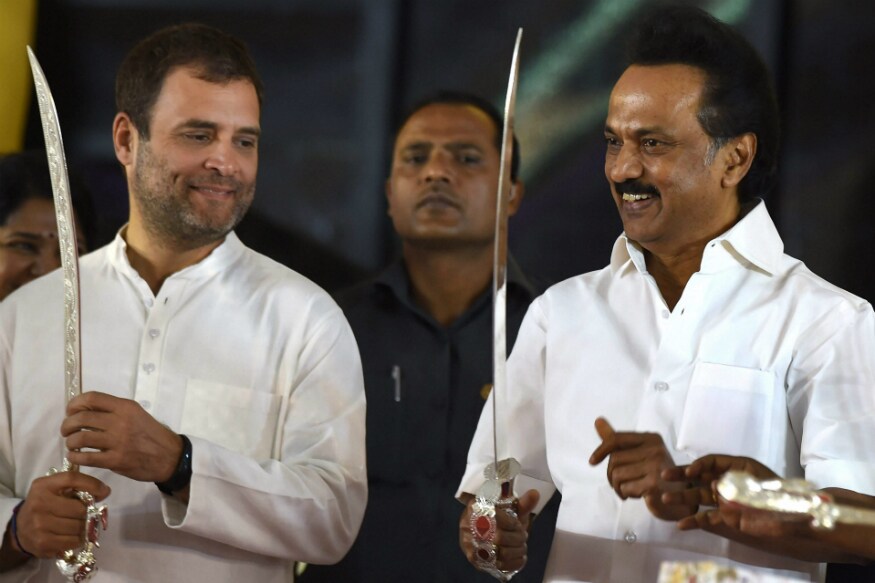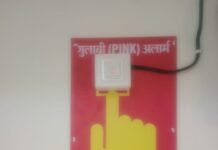
The first war leader to make a strong pitch for Congress leader Rahul Gandhi’s PM candidature for next year’s Lok Sabha polls, DMK chief MK Stalin ended up emulating RJD supremo Lalu Prasad Yadav who had beaten the other allies to propose Sonia Gandhi’s name for the top post long before the alliances for the UPA were stitched up in 2004.
Though Stalin was essentially taking a cue from DMK patriarch M Karunanidhi, who had publicly declared support for the Nehru-Gandhi family, it is also a fact that Lalu Prasad Yadav was the first off the opposition bloc to back Sonia Gandhi for the Prime Minister’s post.
The RJD chief’s ringing endorsement had come at a time when there were doubts about Sonia Gandhi’s acceptability on account of her foreign origins.
As in the case of his mother, there are acceptability issues with Rahul Gandhi as well. Not many are convinced that he has what it takes to lead the country. But like Lalu Prasad Yadav, Stalin has nonetheless taken the lead in projecting the Nehru-Gandhi scion as the opposition’s prime ministerial candidate.
At one level, Stalin’s declaration was aimed at cementing ties with the Nehru-Gandhi family, but coming shortly after the Congress wrested three states from the BJP, it had a whiff of sycophancy about it. Stalin clearly wants to be on the right side of the lead player of the prospective opposition coalition so he has the upper hand in seat-sharing negotiations and can also play an important role at the national level.
Not very different from Lalu Prasad Yadav. It was this public display of loyalty to Sonia Gandhi which ensured that an adamant RJD chief managed to have his way in 2004 when he won the bid for the Railway Ministry even though his compatriot from Bihar and Lok Janshakti Party leader Ram Vilas Paswan was eyeing the same portfolio.
Similarly, the DMK had initially refused to join the first Manmohan Singh government when it was not given the portfolios of its choice. It only relented when its demands for the shipping ministry and Minister of State for Finance post were met.
But in the process of improving his standing with the new Congress president, Stalin inadvertently played into the hands of the BJP. It has also led to disquiet within the Congress and discomfited other potential allies.
The BJP is, understandably, keen that the 2019 Lok Sabha election is converted into a presidential contest with Rahul Gandhi being pitted against Prime Minister Narendra Modi. Though the aura around Modi has waned a bit, his popularity ratings still remain on the higher side.
Modi’s projection as a strong and decisive leader, combined with his powerful oratory, puts him streets ahead of the Congress president. On his part, Rahul Gandhi has definitely earned his stripes with the party’s victories in Rajasthan, Madhya Pradesh and Chhattisgarh, but still has some distance to cover before he is accepted as a Prime Ministerial contender.
The consternation in the Congress camp can also be comprehended. The party, including Rahul Gandhi himself, has repeatedly maintained that the next year’s electoral battle is not about personalities but about ideologies and issues, and it would like to keep it that way. Similarly, Congress leaders are equally quick to point that the leadership issue will be decided collectively after the elections.
Any hint that the 2019 election is a Modi versus Rahul contest will queer the pitch for the proposed grand opposition alliance and drive away fence-sitters who may be unhappy with Modi but are still not sure that Rahul Gandhi is the right choice for the country’s top post.
Stalin’s proposal has naturally not gone down well with other regional satraps who are unwilling to play second fiddle to Rahul Gandhi. They are wary of the Congress party’s big brother attitude; these leaders want to be treated as equal partners. Moreover, both West Bengal chief minister Mamata Banerjee and BSP chief Mayawati nurse national ambitions, though they would grudgingly have to accept the Congress as the anchor of the opposition coalition.
It was, therefore, not surprising that their parties, as well as Samajwadi Party president Akhilesh Yadav, were quick to reject the DMK chief’s proposal. Since these parties are all in a pole position in their respective states of West Bengal and Uttar Pradesh, none of its leaders want to be seen kowtowing to the Congress even before they begin seat-sharing negotiations for the next Lok Sabha election.
Besides, the fact that the Congress presence in these states is negligible, the regional satraps believe they can call the shots both before and after elections as they are together sitting on a kitty of 122 seats which make a substantial contribution to the central pool.
That the BSP, the Trinamool Congress and the SP are cool to the Congress was evident from the fact that their leaders stayed away from the swearing-in ceremonies of the three Congress chief ministers in the Hindi heartland states. Whether it is Mayawati, Mamata Banerjee or Akhilesh Yadav, they all understand that they hold the key to the still-in-the-pipeline opposition coalition, which, in turn, will determine the course of next year’s Lok Sabha poll.



